Australia Day is the anniversary of the arrival of the First Fleet of convict ships from Great Britain in 1788, here is a brief history of Australia's national day.
- On January 26th 1788, Captain Arthur Phillip, the first governor of the fledgling colony of NSW, leading the first fleet of eleven convict ships, arrived at Sydney Cove.
- Thirty years later In 1818, NSW Governor Lachlan Macquarie made the anniversary of the landing a public holiday, with thirty guns fired out.
- In 1837 the first Sydney Regatta was held, and on the same day in 1838, jubilant crowds were packing the harbour to witness events, and the raising of the NSW flag. The 'sister colonies' of Van Diemens Land (to become Tasmania), Western Australia and South Australia were toasted on the day, although they had their own founding dates and anniversaries.
- In 1888, representatives of the 'sister colonies' came to Sydney to celebrate. Elizabeth Kwan writes that many newspaper editorials of the time were promoting the 'national' sentiments of the event, years before federation in 1901.
- Australia Day – the 26th of January - faced a number of challenges in the first years of the 20th Century. It was suggested that January 26th provided a bad start for the colony, and that the day of Cook's landing, 29th April might be considered. January 26th held out.
- Far from happy sailing on all fronts, the 'Day of Mourning' was' first held in 1938, with aboriginal protesters putting a different viewpoint forward, despite floats in the official procession in Sydney featuring indigenous people.
- 1935 was the first year that all states and territories used the name 'Australia Day'.
- 1988 saw Sydney Harbour the focus of attention once more, with tall ships sailing in to commemorate 200 years of European settlement.
- It wasn't until 1994 that January 26th was consistently celebrated as a public holiday by all states and territories.
- Many indigenous Australians and others refer to the day as Invasion Day - and in recent years Survival Day - and counter-demonstrations occur each year. Former Australian of the Year Mick Dodson suggested the date be moved, but Prime Minister Kevin Rudd answered with a “simple, respectful, but straightforward no".

